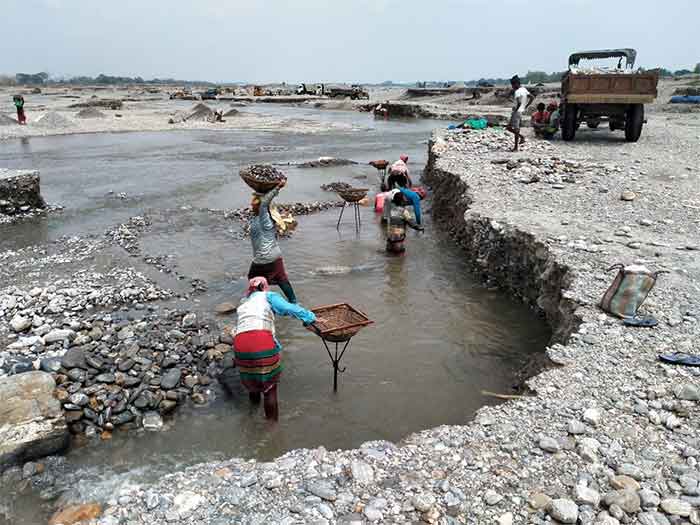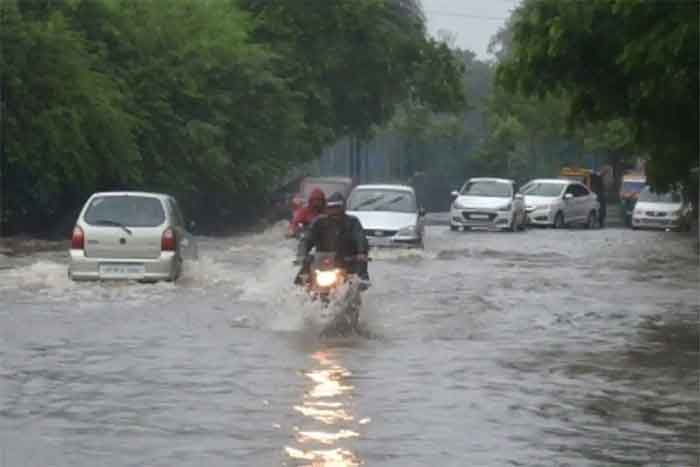During lockdown, the ban on sand mining in the Matigara block of Siliguri in West Bengal has left over 2000 labourers struggling to make ends meet.

Siliguri: In the Matigara block of Siliguri, West Bengal, over 2000 labourers who are solely dependent on the sand lifting business along the Balasun river, believe if COVID-19 won’t kill them, hunger definitely will.
In March last year, a ban was imposed on sand mining in Siliguri. As cases of COVID-19 subsequently dipped, the work resumed but just for three months. The ban, once again implemented in March this year, has currently been extended till mid-September.
The economic condition of the villagers under Matigara block − Dhimal Jote, Sisabari, Balasan Colony, Palpara, Lenin Colony under Atharakhai Gram Panchayat – has deteriorated following a ban on the work of lifting minerals from the river bed. At least around 2000 workers, 80 percent of whom are women, earn their livelihood lifting sand and boulders, while their men spend their day drinking. In addition, many lost their jobs since machines replaced workers to load the trucks with river minerals.
Most of the people residing in these villages are migrants, who have no other source of livelihood. Some are native tribes while the rest are from the Dhimal community, a diminishing community residing in West Bengal and Nepal, who earn their livelihood by farming or working as labourers.
Being jobless for months, the labourers are struggling to provide for their families and many are on the verge of starvation. Most of them are also not getting vaccinated as they would rather spend time looking for work than standing in queues to get the jab.
Struggle for survival
 Pratima Roy, a resident of Sisabari village, used to support her family of five with her earning of Rs 300 a day. “But now, there is no food in the house. We have gotten used to skipping meals due to the situation. We have no source of income. Moreover, my husband spends his entire day drinking. We are solely dependent on the weekly supplies provided by the government but most of the labourers are deprived of that too as they do not possess a ration card. That is why we leave our houses in search of jobs early in the morning but have to return empty handed in the evening. Last year too we did not get any help from the government but we somehow survived. But this time things are very tough. Our cry for help falls into deaf ears of the owners we work for,” said Roy.
Pratima Roy, a resident of Sisabari village, used to support her family of five with her earning of Rs 300 a day. “But now, there is no food in the house. We have gotten used to skipping meals due to the situation. We have no source of income. Moreover, my husband spends his entire day drinking. We are solely dependent on the weekly supplies provided by the government but most of the labourers are deprived of that too as they do not possess a ration card. That is why we leave our houses in search of jobs early in the morning but have to return empty handed in the evening. Last year too we did not get any help from the government but we somehow survived. But this time things are very tough. Our cry for help falls into deaf ears of the owners we work for,” said Roy.
Prashant Barman and his wife Rogoni, who have been in the business of lifting sand/stones for the last 20 years, are the only bread earners for their family of nine members. “Last year we had taken a loan of Rs 1.05 lakhs due to the pandemic to stabilise the family condition, but we are unable to pay the monthly instalment of Rs 3500 following suspension of work.”
Barman added that the advancement of technology and increased use of machinery has also led to many people losing their jobs. “Many workers have moved to Nepal in search of work,” he said. According to him, machines, which started to come into use extensively after the lockdown in order to get work done faster, replace the work of at least 100 labourers.
Government ambivalence
But this slowdown in work is actually belated and would have come earlier if government regulations were followed. Maybe outside the lockdown, the workers here might have had better luck finding an alternate source of income.
A lot of the sand mining going on in Siliguri is illegal, says Animesh Bose, the programme coordinator of Himalayan Nature and Adventure Foundation (HNAF), a non-profit organisation based in Siliguri. “Siliguri has a major demand for construction and there are two rivers supplying the raw materials — Mahananda and Balasun.” He stated that a maximum amount of sand lifting has now been shifted to Balasun as it is located on the outskirts of the town and about 2000 labourers who have migrated from other places are directly dependent on the river for their livelihood.
“Illegal sand mining has a huge impact on the river ecosystem. The river gets polluted with the leakage of the gear oils and day-long human activities on the river bed hampering both aquatic flora and fauna. These activities lead to change in the river course, which can be devastating and biodiversity can be damaged,” he said.
Bose further added that specific guidelines have been prescribed for such activities by the National Green Tribunal (NGT). “But no one pays heed to the guidelines. Moreover, there is no vigilance from the Land and Land Reforms Department as without their permission nothing can be done. The lack of vigilance in the royalty process causes a loss of millions of rupees every year. A tender is called by the department which specifies from where the lifting can be done but if the permission has been given for 100 trucks, 1000 trucks are involved in the process without paying the royalty,” he explained.
There is a huge gap between what has been declared on paper and its implementation on the ground, mostly because there is no clarity in government direction. While the West Bengal government released a notification in June this year calling for a ban during the monsoons, this is practically not possible due to the need to expedite emergency works.
By orders of District Land and Land Reforms Office, Jalpaiguri, operations are to remain suspended June 16 to September 15 and its commencement is to be notified after studying the riverbed replenishment status and the environment clearance conditionalities of each mine. The notification seeks District Level, Sub-Divisional Level and Block Level Task Forces to conduct frequent raids at the various strategic locations under their respective jurisdiction.
But clearly work is still going on in some locations. According to the Darjeeling district administrative officials, relaxation is being given for essential work like protection work, disaster management , road repairs etc. Sand is required for construction of oxygen plants, hospitals and other emergency infrastructure. This cannot be entirely banned or the various works that are underway will be delayed for at least 3 months, according to officials.
Darjeeling District Magistrate, S Ponnambalam admitted, “We have not entirely banned sand mining. We are working on putting in regulations. We will find a way out as there are emergency works going on as of now.”
It is in hope such rare work that the Barmans go to the river every day and wait in the hope. But these days, more often than not, no one turns up.
Roshan Gupta is a Siliguri-based freelance journalist and a member of 101Reporters.com, a pan-India network of grassroots reporters.
GET COUNTERCURRENTS DAILY NEWSLETTER STRAIGHT TO YOUR INBOX











































